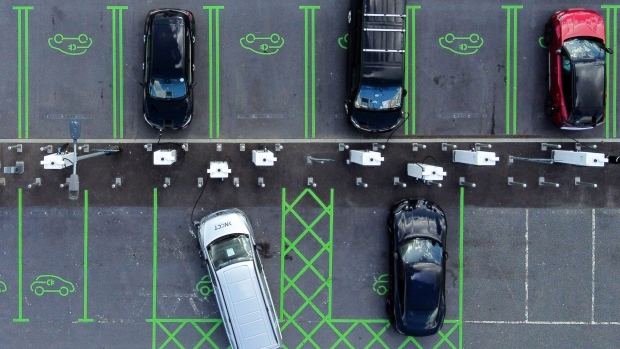Nov 28, 2023
EU Pitches Three Options to Deal With Post-Brexit Tariffs on Electric Cars
, Bloomberg News

(Bloomberg) -- The European Commission has come up with three options for how to deal with painful tariffs on electric cars traded with the UK, including one to delay them by as many as three years, according to people familiar with the matter.
The options — the other two are doing nothing, or introducing a 12-month “cushion” — were informally presented to member states this week, the people said, declining to be named because the talks are private.
Under current post-Brexit arrangements to be phased in from Jan. 1, EVs moving between the UK and the European Union will attract a 10% duty if less than 45% of their value comes from the region. The policy is meant to encourage development of a European battery supply chain.
A lobby representing carmakers including Volkswagen AG and Renault SA has warned the duties could cost the sector €4.3 billion ($4.7 billion) over the next three years. They want to delay the plan until local cell supply is ready. Germany, the UK and most other member states also favor a delay until 2027.
France, previously the only major member state opposed to an outright delay, has said it’s open to a solution that would ensure European manufacturers are cushioned against the impact of tariffs, including with a short transition period. But Paris also underlined that the post-Brexit trade deal should not be reopened and that European production would soon be able to meet the demands of exports to the UK. France reiterated similar positions at this week’s meeting and said it was assessing the matter, the people said.
Read more: EU Races for Post-Brexit EV Tariff Proposals as France Softens
In putting forward the options, Brussels is trying to balance safeguarding the automotive industry while also incentivizing more EU battery production, the people said. The vast majority of member states who intervened during the meeting said they preferred a straightforward extension but some were open to the cushioning option, they said.
That possibility would see a statement on origin made by exporters this year and applying it to multiple vehicles of the same model for a period of 12 months.
The option envisions local battery production in the EU picking up next year and assumes that carmakers can then steer content toward specific export destinations such as the UK, where the stricter requirements will be in force.
However, it would not guarantee that EVs entering production in 2024 and 2025 aren’t subject to tariffs and not all manufacturers would likely be able to adjust their supply chains in time to meet the content requirements. The measure would also require EU help as well as coordination with UK customs authorities.
At this week’s meeting, several member states described the cushioning option as complicated and asked the commission, which is the EU’s executive arm, to provide further information in writing, the people said.
Any solution that requires amending the EU-UK Trade and Cooperation Agreement, or TCA, would need the backing of member states followed by a decision with Britain.
Discussions are set to continue in the coming days and a decision is needed next month, the people said.
©2023 Bloomberg L.P.


